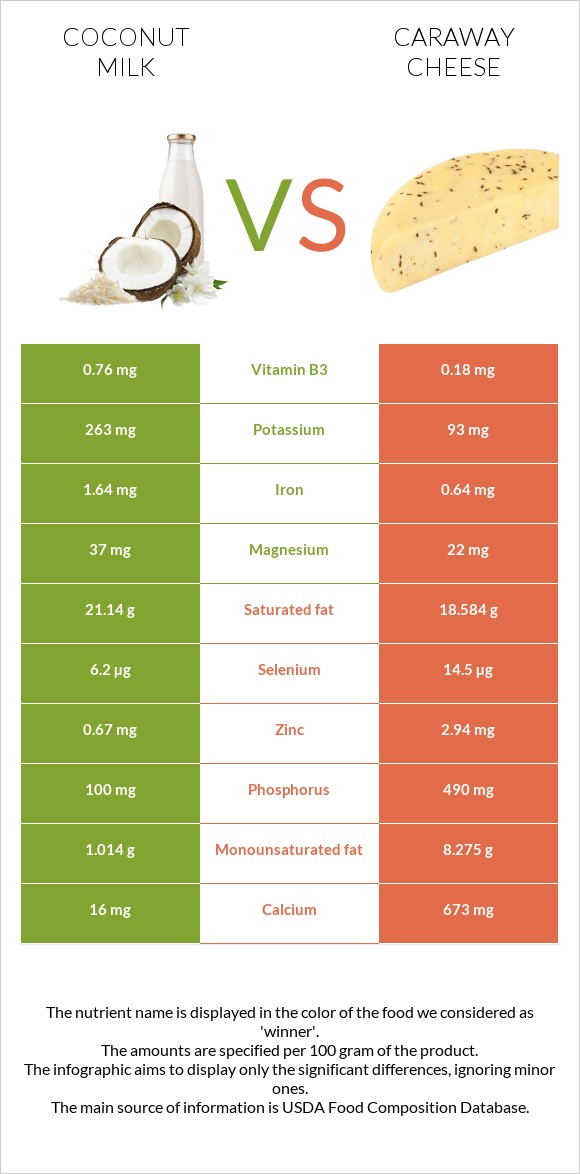Coconut milk vs. Caraway cheese — In-Depth Nutrition Comparison
Compare
A recap on the differences between coconut milk and caraway cheese
- Coconut milk is higher in manganese and copper, yet caraway cheese is higher in calcium, phosphorus, vitamin B2, vitamin A, zinc, and selenium.
- Caraway cheese covers your daily calcium needs 66% more than coconut milk.
- Coconut milk contains 44 times more manganese than caraway cheese. While coconut milk contains 0.916mg of manganese, caraway cheese contains only 0.021mg.
- The amount of sodium in coconut milk is lower.
Food varieties used in this article are Nuts, coconut milk, raw (liquid expressed from grated meat and water) and Cheese, caraway.
Infographic

Infographic link
Mineral Comparison
Mineral comparison score is based on the number of minerals by which one or the other food is richer. The "coverage" charts below show how much of the daily needs can be covered by 300 grams of the food.
| Contains more MagnesiumMagnesium | +68.2% |
| Contains more PotassiumPotassium | +182.8% |
| Contains more IronIron | +156.3% |
| Contains more CopperCopper | +1008.3% |
| Contains less SodiumSodium | -97.8% |
| Contains more ManganeseManganese | +4261.9% |
| Contains more CalciumCalcium | +4106.3% |
| Contains more ZincZinc | +338.8% |
| Contains more PhosphorusPhosphorus | +390% |
| Contains more SeleniumSelenium | +133.9% |
Vitamin Comparison
Vitamin comparison score is based on the number of vitamins by which one or the other food is richer. The "coverage" charts below show how much of the daily needs can be covered by 300 grams of the food.
| Contains more Vitamin CVitamin C | +∞% |
| Contains more Vitamin EVitamin E | +∞% |
| Contains more Vitamin B3Vitamin B3 | +322.2% |
| Contains more Vitamin KVitamin K | +∞% |
| Contains more Vitamin AVitamin A | +∞% |
| Contains more Vitamin B1Vitamin B1 | +19.2% |
| Contains more Vitamin B2Vitamin B2 | +∞% |
| Contains more Vitamin B6Vitamin B6 | +124.2% |
| Contains more Vitamin B12Vitamin B12 | +∞% |
| Contains more FolateFolate | +12.5% |
All nutrients comparison - raw data values
| Nutrient |  |
 |
DV% diff. |
| Calcium | 16mg | 673mg | 66% |
| Phosphorus | 100mg | 490mg | 56% |
| Protein | 2.29g | 25.18g | 46% |
| Manganese | 0.916mg | 0.021mg | 39% |
| Vitamin B2 | 0mg | 0.45mg | 35% |
| Cholesterol | 0mg | 93mg | 31% |
| Vitamin A | 0µg | 271µg | 30% |
| Sodium | 15mg | 690mg | 29% |
| Copper | 0.266mg | 0.024mg | 27% |
| Zinc | 0.67mg | 2.94mg | 21% |
| Monounsaturated fat | 1.014g | 8.275g | 18% |
| Selenium | 6.2µg | 14.5µg | 15% |
| Iron | 1.64mg | 0.64mg | 13% |
| Saturated fat | 21.14g | 18.584g | 12% |
| Vitamin B12 | 0µg | 0.27µg | 11% |
| Fiber | 2.2g | 0g | 9% |
| Fats | 23.84g | 29.2g | 8% |
| Calories | 230kcal | 376kcal | 7% |
| Potassium | 263mg | 93mg | 5% |
| Magnesium | 37mg | 22mg | 4% |
| Vitamin B3 | 0.76mg | 0.18mg | 4% |
| Polyunsaturated fat | 0.261g | 0.83g | 4% |
| Vitamin C | 2.8mg | 0mg | 3% |
| Vitamin B6 | 0.033mg | 0.074mg | 3% |
| Choline | 8.5mg | 2% | |
| Carbs | 5.54g | 3.06g | 1% |
| Vitamin E | 0.15mg | 1% | |
| Folate | 16µg | 18µg | 1% |
| Net carbs | 3.34g | 3.06g | N/A |
| Sugar | 3.34g | N/A | |
| Vitamin B1 | 0.026mg | 0.031mg | 0% |
| Vitamin B5 | 0.183mg | 0.19mg | 0% |
| Vitamin K | 0.1µg | 0% | |
| Tryptophan | 0.027mg | 0.324mg | 0% |
| Threonine | 0.083mg | 0.896mg | 0% |
| Isoleucine | 0.09mg | 1.563mg | 0% |
| Leucine | 0.17mg | 2.412mg | 0% |
| Lysine | 0.101mg | 2.095mg | 0% |
| Methionine | 0.043mg | 0.659mg | 0% |
| Phenylalanine | 0.116mg | 1.326mg | 0% |
| Valine | 0.139mg | 1.682mg | 0% |
| Histidine | 0.053mg | 0.884mg | 0% |
Macronutrient Comparison
Macronutrient breakdown side-by-side comparison
Protein:
2.29 g
Fats:
23.84 g
Carbs:
5.54 g
Water:
67.62 g
Other:
0.71 g
Protein:
25.18 g
Fats:
29.2 g
Carbs:
3.06 g
Water:
39.28 g
Other:
3.28 g
| Contains more CarbsCarbs | +81% |
| Contains more WaterWater | +72.1% |
| Contains more ProteinProtein | +999.6% |
| Contains more FatsFats | +22.5% |
| Contains more OtherOther | +362% |
Fat Type Comparison
Fat type breakdown side-by-side comparison
Saturated fat:
Sat. Fat
21.14 g
Monounsaturated fat:
Mono. Fat
1.014 g
Polyunsaturated fat:
Poly. Fat
0.261 g
Saturated fat:
Sat. Fat
18.584 g
Monounsaturated fat:
Mono. Fat
8.275 g
Polyunsaturated fat:
Poly. Fat
0.83 g
| Contains less Sat. FatSaturated fat | -12.1% |
| Contains more Mono. FatMonounsaturated fat | +716.1% |
| Contains more Poly. FatPolyunsaturated fat | +218% |





